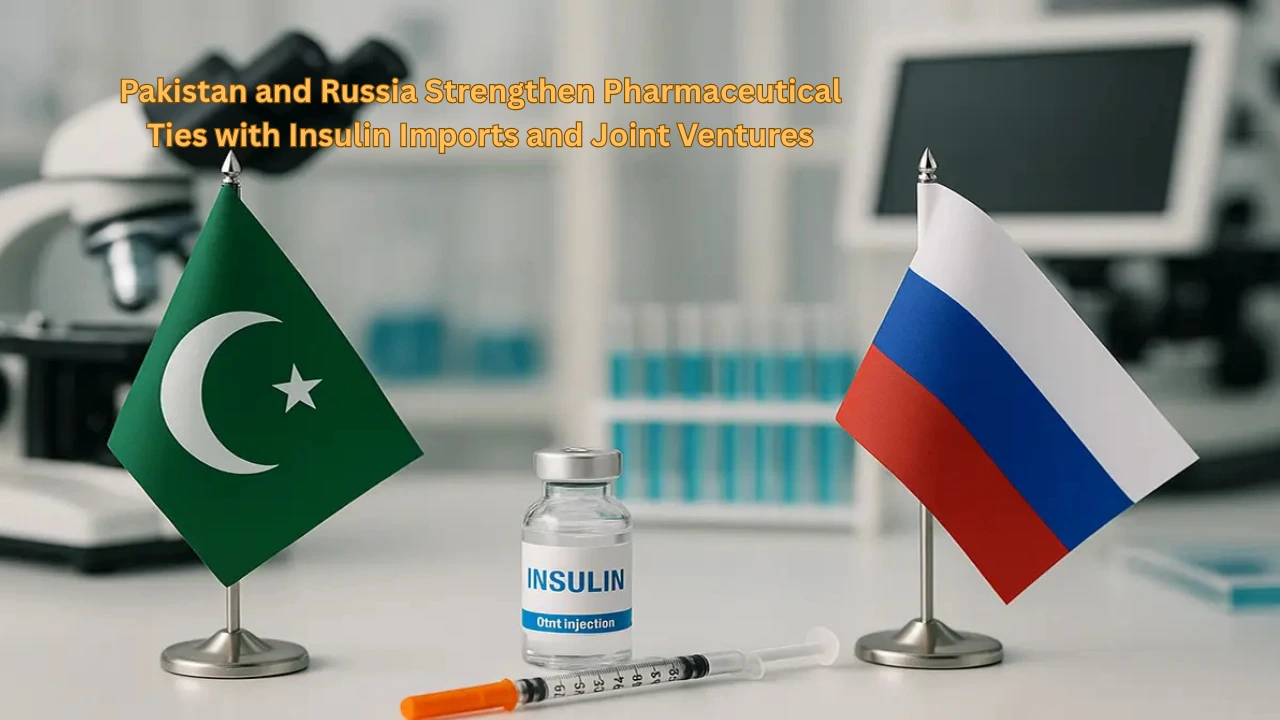Insulin Imports & Pharma Joint Ventures Advance Bilateral Partnerships
ISLAMABAD:
Pakistan and Russia are moving ahead on Insulin Imports through pharmaceutical joint ventures. This step marks a major leap in bilateral cooperation. The initiative aims to ensure a reliable insulin supply for Pakistan’s diabetic patients.
A high-level meeting convened by Special Assistant to the Prime Minister (SAPM) on Industries and Production Haroon Akhtar Khan reviewed the current status. Russian government representative Denis Nazarov and senior officials from the Ministry of Industries, National Health Services, and DRAP also participated.
Key Developments in Insulin Imports & Local Production
DRAP granted registration to Genetics Pharmaceuticals, Lahore, to import insulin from Russia’s Zavod Medsintez. This official approval came on May 5, 2025. “Pakistan-Russia pharma joint ventures for insulin imports”
Later, Genetics applied for a higher maximum retail price (MRP) as allowed by the Drug Pricing Policy of 2018. DRAP issued the revised MRP on June 16. But local producers like Getz Pharma are offering insulin at equal or lower MRPs.
SAPM Akhtar stressed that Pakistan remains a major insulin consumer. He highlighted the urgent need for a steady and affordable supply. The joint protocol with Russian pharmaceutical firms is expected to be finalized soon.
Why Insulin Imports from Russia Matter
Insulin import policy matters now more than ever. Pakistan has over 34 million diabetic adults—about 27% of the population.
In the past, policy uncertainty hindered multinational investment. MNCs like Eli Lilly reduced or stopped operations in Pakistan due to bureaucratic delays.
A Russian supply chain can reduce dependency on European exporters. It can also support local production and pricing transparency, ideally benefiting patients nationwide.
Pakistan’s Insulin Import Landscape
Pakistan’s insulin import reliance has widened in recent years. In 2023, imports reached approximately $10.4 million, sourcing from India, China, Malaysia, and others
In 2022, total imports amounted to $5.4 million, drastically lower than 2023 levels. Earlier in 2021, insulin imports were just $3.8 million, mostly from India and China.
This trend shows rising demand and widening supply partnerships. An agreement with Russia could diversify supply and potentially stabilize costs.
Pricing & MRP Transparency Challenges
As the MRP review continues, the requested MRP for Russian insulin matches that of originator brands like Eli Lilly. Without data backing the request, those prices may exceed insulin from competitors like Novo Nordisk.
Under DRAP and the drug pricing committee, MRP must be calculated transparently—accounting for landed cost, import duties, a 40% markup, and a 15% retail discount. Hardship requests are allowed under specific conditions.
Local pharma players argue they can keep insulin prices competitive through biosimilar production and lower overheads.
Looking Ahead: Local Production & Joint Venture Protocols
In alignment with Prime Minister Shehbaz Sharif’s vision, Pakistan aims to begin local insulin manufacturing with Russian collaboration. Development of implementation protocols is underway.
Key stakeholders have been directed to prepare a detailed joint venture proposal. It is expected to move through the Cabinet Committee for approval shortly.
If approved, the joint venture may catalyze Pakistan’s long-term goal of domestic essential medicine production, reducing reliance on imports and boosting self-reliance in healthcare.
Strategic & Health Implications
This partnership impacts more than pharma trade:
- Strengthens Pakistan-Russia pharmaceutical ties
- Enhances insulin availability and affordability
- Encourages biosimilar and local drug manufacturing
- Supports stable pricing for diabetic care across Pakistan
The move could reshape insulin supply chains, with local firms gaining technology transfer, production experience, and pricing power.
As the policy framework continues to evolve, patients and patients’ advocates await clear outcomes on pricing and availability. A transparent and affordable roll-out will define success.
Conclusion: Insulin Imports & JVs Forge New Path Forward
Pakistan’s Insulin Imports initiative with Russian pharmaceutical firms marks a new chapter in healthcare collaboration. The registration of imports, MRP scrutiny, and joint venture planning indicate policy alignment and seriousness.
If executed effectively, this model could establish a sustainable, affordable insulin supply while empowering local manufacturers. For Pakistan’s growing diabetic population, it represents hope for stable and reliable treatment access. Click here for latest news.


